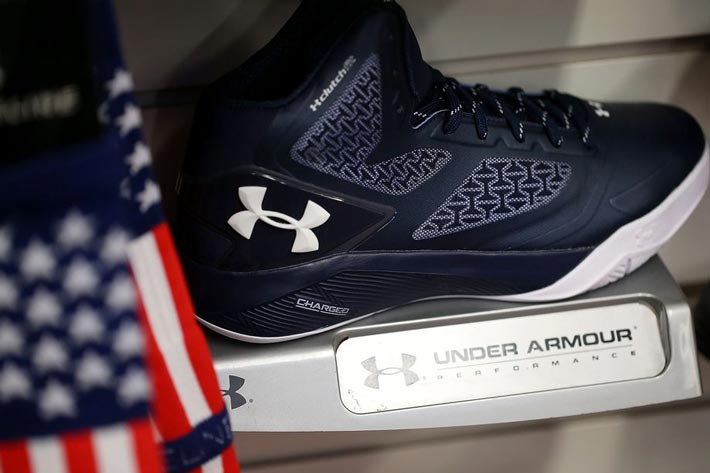CEO Kevin Plank calls Trump “a real asset for this country.”

Put Under Armour in the pro-Trump column. The sportswear company’s CEO Kevin Plank went on CNBC earlier today and offered praise for the president. “To have such a pro-business President is something that is a real asset for the country.”
It’s a far cry from what Plank said on the day of the election: “I stayed up until 4 a.m. this morning watching the coverage myself,” he told Footwear News. “I think we all had the same reaction... But this is going to be our president, and we all have to embrace it.”
Now Plank is one of the CEOs participating in Trump’s manufacturing jobs initiative, along with executives from Dell Technologies, Whirpool, and Ford — probably because he, like the president, is passionate about manufacturing in America.
Under Armour’s moves to bring more manufacturing jobs back to the States include the brand’s UA Lighthouse facility. The 35,000-square-foot building opened last year — aka pre-Trump — and is a “groundbreaking new design and manufacturing hub,” according to the brand’s site. Under Armour’s new Made in America collection, titled the Arris Project, was developed at the UA Lighthouse and just hit stores last week.
However, nearly two-thirds of Under Armour's products are manufactured in China, Jordan, Vietnam and Indonesia, according to The Baltimore Sun. The Lighthouse and the Arris Project it birthed illuminate many of the complications that emerge in the seemingly straightforward effort to bring jobs back to America.
Does bringing manufacturing back to the US actually bring jobs back?
Plank has lamented that we’ve been making clothes the same way for 100 years, and he hopes to change that with the innovation happening at UA Lighthouse. But a huge innovation in the footwear industry, as in other industries, is automation. Adidas now has two Speedfactories, its automated robot-helmed sites. According to Fortune, these only require 160 employees, cutting out many of the humans formerly needed for this kind of factory work.
Plank is fully aware of this tradeoff. When asked about creating jobs in the US, Plank told Footwear News, “It’s not pegged to have 175,000 of those jobs come back to America. I just wonder if there is a way that we can be more thoughtful, creative, and innovative. What if we could bring 100 of those jobs or 500 or 1,000 or 10,000 here?”
How does that affect the costs of products?
Even if we bring back just a few jobs by manufacturing in America, that impacts costs. Under Armour has to raise prices to keep up with manufacturing costs, and part of the company’s experimentation around Lighthouse is testing how much the American consumer is willing to pay for American-made goods. It’s a challenge New Balance has with its own Made in America collection: The NB Made in America shoes cost upwards of $165, compared to shoes in its core line that cost $100 less.
Under Armour’s recent financial hardships haven’t been directly attributable to Made-in-the-USA price hikes. But with a company already suffering from sluggish sales, it’s doubtful it would help.
What kind of jobs do we really want, though?
Then there’s the tradeoff of jobs. Under Armour was hailed in 2015 for moving its shipping to the port of Baltimore. The port provides Baltimore residents with 14,600 jobs, according to The Baltimore Sun — if Under Armour stopped shipping a large majority of its products there, wouldn’t those jobs inevitably dwindle?
Bringing some manufacturing back to the US doesn’t mean bringing all of it.
For all his enthusiasm about making products in Baltimore, Plank said on CNBC today, “The border tax would have an absolutely very, very difficult effect on all companies in the consumer space, particularly retailers,” adding, “It's the No. 1 issue when you ask me about the new administration.”
A border tax would penalize companies that import goods or materials, and that’s something that almost every American retailer still relies on heavily. Moving 100% of production into the United States would take a huge investment by any retail company — which could also mean increased prices for consumers.
No matter what, apparel companies and retailers are going to feel the impact of any change from above, from domestic taxes and tariffs to automation. Under Armour is but one case study to see how all these policies decisions affect the normal consumer.
Source: http://www.racked.com
